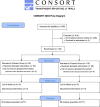Standardized Brazilian green propolis extract (EPP-AF®) in COVID-19 outcomes: a randomized double-blind placebo-controlled trial
- PMID: 37891178
- PMCID: PMC10611696
- DOI: 10.1038/s41598-023-43764-w
Standardized Brazilian green propolis extract (EPP-AF®) in COVID-19 outcomes: a randomized double-blind placebo-controlled trial
Abstract
SARS-CoV-2 and its different variants caused a "wave and wave" pandemic pattern. During the first wave we demonstrated that standardized Brazilian green propolis extract (EPP-AF®) reduces length of hospital stay in adult patients with COVID-19. Afterwards, we decided to evaluate the impact of EPP-AF in hospitalized patients during the third wave of the pandemic. BeeCovid2 was a randomized, double-blind, placebo-controlled clinical trial in hospitalized COVID-19 adult patients. Patients were allocated to receive an oral dose of 900 mg/day of EPP-AF® or placebo for 10 days. The primary outcome was length of hospital stay. Secondary outcomes included safety, secondary infection rate, duration of oxygen therapy dependency, acute kidney injury and need for intensive care. Patients were followed up for 28 days after admission. We enrolled 188 patients; 98 were assigned to the propolis group and 90 to the placebo group. The post-intervention length of hospital stay was of 6.5 ± 6.0 days in the propolis group versus 7.7 ± 7.1 days in the control group (95% CI - 0.74 [- 1.94 to 0.42]; p = 0.22). Propolis did not have significant impact on the need for oxygen supplementation or frequency of AKI. There was a significant difference in the incidence of secondary infection between groups, with 6.1% in the propolis group versus 18.9% in the control group (95% CI - 0.28 [0.1-0.76], p = 0.01). The use of EPP-AF was considered safe and associated with a decrease in secondary infections. The drug was not associated with a significant reduction in length of hospital stay. ClinicalTrials.gov (NCT04800224).
© 2023. The Author(s).
Conflict of interest statement
The authors declare no competing interests.
Figures
References
Publication types
MeSH terms
Substances
Associated data
LinkOut - more resources
Full Text Sources
Medical
Miscellaneous



